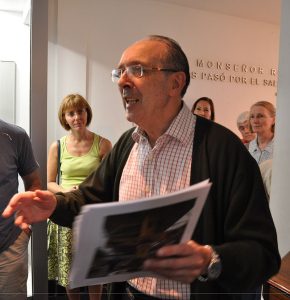Extract Jon Sobrino and A Preferential Option for the Poor
July 5, 2018
Thang Nhat Nguyen – A Preferential option for the poor in Jon Sobrino’s Theology

Jon Sobrino (1938-) is one of several liberation theologians arguing for a preferential option for the poor. He lives in El Salvador.
As Gustavo Gutiérrez asserts, “theology must be critical reflection on humankind, on basic human principles.”
It recognises that theology is a second step: the critical reflection on Christian praxis (practice within a context). Liberation theology must be a theology from below which does not simply repeat formulas of faith in God, but speaks about God who identifies with the poor and the most abandoned. The mission of theology today as produced by liberation theologians takes the historical Jesus as the starting point for its reflection on Christology. It is the Christology that attends to classic theological themes while at the same time stresses the importance of life experiences. As Jon Sobrino explains, Christology is not merely the Christology of Christ but also it is the christology of the body of Christ.(Jon Sobrino, Jesus The Liberator, Maryknoll, N.Y.: Orbis Books, 2001, 26.)
Theology in general must give answers to these questions: How can we best encounter the many struggles in life? How do we incarnate the Gospel into the world and foster the values of truth, hope, justice and peace? How does theology communicate and change the world itself?
In the Scriptures, a name often carries with itself a special meaning. A name is not only an
identification but also expresses an identity of the one who bears it. In the Old Testament (OT),
God reveals God-self to Israelites through names. God’s people also called their God by many
names or titles. The meaning behind each title reveals the personality, characteristic and nature
of God that God’s people would like to recognize. So we see the faithful God (Deut 7, 9); the
righteous God (Is 45, 21); the jealous God (Ex 20, 5; Num 5, 14. 30; Joel 2, 18); the mighty God
portraying a picture of God as warrior and champion (Is 9, 6); God of Truth (Ps 31, 5); or
Compassionate God (Deut 4, 31). Among the many titles which are attributed to God, many
place their emphasis on God’s great love for the poor. Many times God has already laid out divine compassion and intervention towards the poor and the oppressed. For example, God is
portrayed as the defender of the orphan, the widow, the stranger, the meek and the oppressed
(Deut 10, 18; Ps10, 16-18; Jer 22, 16). The Psalmist declares that “the Lord hears the cry of the
poor” (Ps 34). God is the protector of the poor (Ps 12, 5) and the provider of the poor (Ps 68, 10;
Is 41, 17). God has promised to send among the oppressed a savior to defend and deliver them
(Is 19, 20). Realizing what lies behind the meaning of these so-called titles can lead us to a better
knowledge of God.
After reading the words of the Exodus, a challenging question arises as to whether or not
God is one who take sides with some individual persons and against others. Does God side with
the oppressed and cast aside the oppressors? This common thread runs through salvation history
in which God always stands by the oppressed and defends the poor. Gustavo Gutiérrez
recognizes the dilemma between the God of all and the God of the poor when he asks “How can
we reconcile the universality of charity with the option for a particular social class?”107 Indeed,
reading works of liberation theology, we can easily view a dialectic class struggle between the
rich and the poor, the oppressed and the oppressors. For these theologians, such conflict is a
historical fact and not something that Christian theology should foster. This issue was often
proclaimed at the time of Medellín and Puebla: “There are rich people because there are poor
people, and there are poor people because there are rich people”, (Gustavo Gutiérrez, A Theology of Liberation, 273).
Jon Sobrino holds that God cannot be understood apart from his partial compassion and
concern for the poor. The God of Jesus is the God of preference towards victims. This is a “God
whose steps are firm, self-lowering and embracing,”111 according to Jon Sobrino. Without doubt,
God of the poor expresses the absolute difference between God and humans, between the
unlimited and the limited, between the infinite and the finite. The poverty of human beings gives
God a chance to freely share his love, freedom and abundance of life. However, Sobrino tries not
to view the option for the poor as a confrontation with the oppressors. There are two different
ways of this unique act to show God’s love appropriating with different individual objects. As
Ernesto Valiente observes, “In a reality driven by oppression, God’s disclosure is at once
revelatory and liberating… God’s justice liberates the victims from oppression, and God’s
forgiveness liberates oppressors from their guilt. These merciful and liberating actions have as
their end purpose our incorporation into God’s life.” (Jon Sobrino, No Salvation Outside The Poor, page 118).






0 Comments